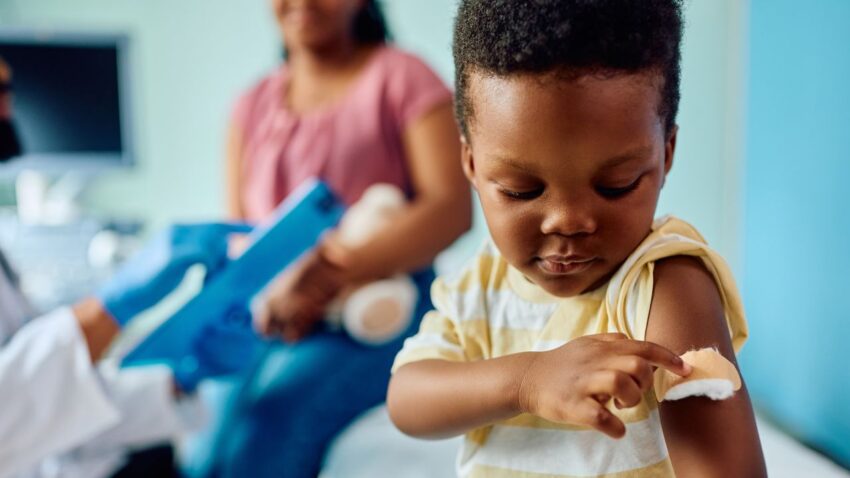Measles, once nearly eradicated in the United States, has made a troubling resurgence in several regions, including Texas. This resurgence highlights the critical importance of vaccination to protect public health. While measles is preventable with a simple vaccine, outbreaks continue to occur due to various factors such as vaccine hesitancy, misinformation, and the challenge of maintaining high immunization rates. In this article, we’ll discuss the causes of measles outbreaks, the importance of the MMR vaccine, and how Texas is responding to this growing concern.
Understanding Measles: What It Is and How It Spreads
Measles is a highly contagious viral infection that primarily affects children, although adults can also be susceptible. The virus spreads through respiratory droplets when an infected person coughs or sneezes. The infection can cause serious complications, including pneumonia, encephalitis (swelling of the brain), and even death in severe cases.
Symptoms of measles typically begin with a fever, cough, runny nose, and inflamed eyes (conjunctivitis). A characteristic red, blotchy rash usually appears a few days later, starting at the head and spreading down to the rest of the body. This rash is one of the key indicators of measles infection.
The virus can survive in the air or on surfaces for up to two hours, making it especially dangerous in crowded environments or places with poor ventilation. The high level of contagiousness means that anyone who is not vaccinated or who has a weakened immune system is at risk.
The Resurgence of Measles in Texas
Texas has experienced several measles outbreaks in recent years, contributing to the nationwide uptick in cases. The reasons for this resurgence are multifaceted:
1. Vaccine Hesitancy and Misinformation
One of the key factors behind the measles outbreaks is vaccine hesitancy. Despite overwhelming evidence supporting the safety and efficacy of the MMR (measles, mumps, and rubella) vaccine, many parents remain hesitant or outright refuse to vaccinate their children. This is often due to misinformation about the vaccine’s safety, including false claims linking the MMR vaccine to autism.
A 2019 study showed that Texas had one of the highest rates of non-medical vaccine exemptions in the country. Areas with low vaccination rates are more susceptible to outbreaks, as fewer individuals are protected from the virus.
2. Global Travel
Measles is still common in many parts of the world, especially in countries with lower vaccination rates. International travel has made it easier for travelers to bring the virus into Texas, leading to outbreaks in local communities. The virus can spread rapidly when a large portion of the population is unvaccinated or under-vaccinated.
3. Declining Immunization Rates
Immunization rates in Texas have been declining in recent years. According to the Centers for Disease Control and Prevention (CDC), a vaccination rate of 95% is needed to achieve herd immunity and prevent the spread of measles. In some parts of Texas, vaccination rates have fallen below this threshold, leaving large segments of the population vulnerable to outbreaks.
The Importance of Vaccination in Preventing Measles
Vaccination is the most effective way to prevent measles and protect vulnerable populations. The MMR vaccine, which protects against measles, mumps, and rubella, is safe, effective, and widely available. Here’s why vaccination is critical:
1. Herd Immunity
Herd immunity occurs when a large portion of a population becomes immune to a disease, either through vaccination or previous infection. This makes the spread of the disease less likely, as there are fewer people for the virus to infect. Vaccination helps achieve herd immunity and protect those who cannot be vaccinated, such as infants, pregnant women, and individuals with compromised immune systems.
2. Preventing Serious Complications
Measles can lead to serious health complications, including pneumonia, encephalitis, and death. The MMR vaccine dramatically reduces the risk of these complications. In fact, before the introduction of the vaccine, measles was responsible for thousands of deaths in the U.S. each year.
3. Eliminating Measles Globally
Vaccination not only protects individuals but also plays a crucial role in eliminating measles on a global scale. The World Health Organization (WHO) has set a target to eliminate measles worldwide by 2030. However, this goal can only be achieved if vaccination rates remain high.
4. Cost-Effectiveness
Preventing measles outbreaks through vaccination is far more cost-effective than treating an outbreak once it has occurred. Measles treatment can be expensive, especially when complications arise, such as hospitalization or long-term care. Vaccination helps reduce these healthcare costs while saving lives.

How Texas is Responding to Measles Outbreaks
In response to the resurgence of measles, Texas health officials have been working to raise awareness about the importance of vaccination. Several measures have been taken to address the issue:
1. Public Awareness Campaigns
The Texas Department of State Health Services (DSHS) has launched public awareness campaigns aimed at educating parents about the safety and efficacy of the MMR vaccine. These campaigns focus on dispelling common myths and misconceptions about vaccines and providing accurate, evidence-based information.
2. Stricter Immunization Requirements for Schools
In Texas, students are required to provide proof of vaccination before attending school. However, the state allows exemptions for medical, religious, and personal reasons. In response to the growing concern over vaccine-preventable diseases, Texas lawmakers have introduced bills to tighten vaccination requirements and reduce non-medical exemptions.
3. Collaboration with Healthcare Providers
Texas healthcare providers are playing a crucial role in addressing vaccine hesitancy. Doctors and pediatricians are often the most trusted source of information for parents, and they are working to ensure that families understand the importance of vaccinating their children.
What You Can Do to Help Prevent Measles
As individuals, there are several steps you can take to help prevent the spread of measles in Texas:
- Get Vaccinated: If you or your child have not yet received the MMR vaccine, it’s important to do so as soon as possible. The CDC recommends that children receive the MMR vaccine at age 1 and again at age 4. Adults who are not vaccinated or who do not have immunity to measles should talk to their healthcare provider about getting vaccinated.
- Encourage Others to Get Vaccinated: Talk to your family and friends about the importance of vaccination. Encourage them to get vaccinated and help dispel myths and misinformation.
- Stay Informed: Stay up-to-date on the latest information about measles and vaccination by following trusted sources, such as the CDC and WHO.
- Practice Good Hygiene: In addition to vaccination, practicing good hygiene—such as washing your hands frequently and covering your mouth when coughing or sneezing—can help reduce the spread of the virus.
Conclusion
The resurgence of measles in Texas serves as a stark reminder of the importance of vaccination in protecting public health. Measles is a preventable disease, and the MMR vaccine remains the most effective tool in preventing its spread. While challenges such as vaccine hesitancy and misinformation persist, efforts to educate the public and increase vaccination rates are critical in stopping further outbreaks.
By working together and prioritizing vaccination, we can protect our communities, reduce the spread of measles, and ensure a healthier future for all.
Frequently Asked Questions (FAQ)
1. What are the symptoms of measles? Measles symptoms include fever, cough, runny nose, red eyes, and a characteristic rash that starts on the face and spreads to the rest of the body.
2. How is measles spread? Measles is highly contagious and spreads through respiratory droplets when an infected person coughs or sneezes. It can also live on surfaces for up to two hours.
3. Why is the MMR vaccine important? The MMR vaccine protects against measles, mumps, and rubella. It is safe, effective, and helps prevent serious complications like pneumonia and encephalitis.
4. Is the MMR vaccine safe? Yes, the MMR vaccine is safe. Extensive studies have shown that it is highly effective in preventing measles and is not linked to autism, despite false claims to the contrary.
5. How can I protect my child from measles? The best way to protect your child from measles is to ensure they receive the MMR vaccine according to the recommended schedule.

1 thought on “Measles Outbreak and Vaccine Importance in Texas”